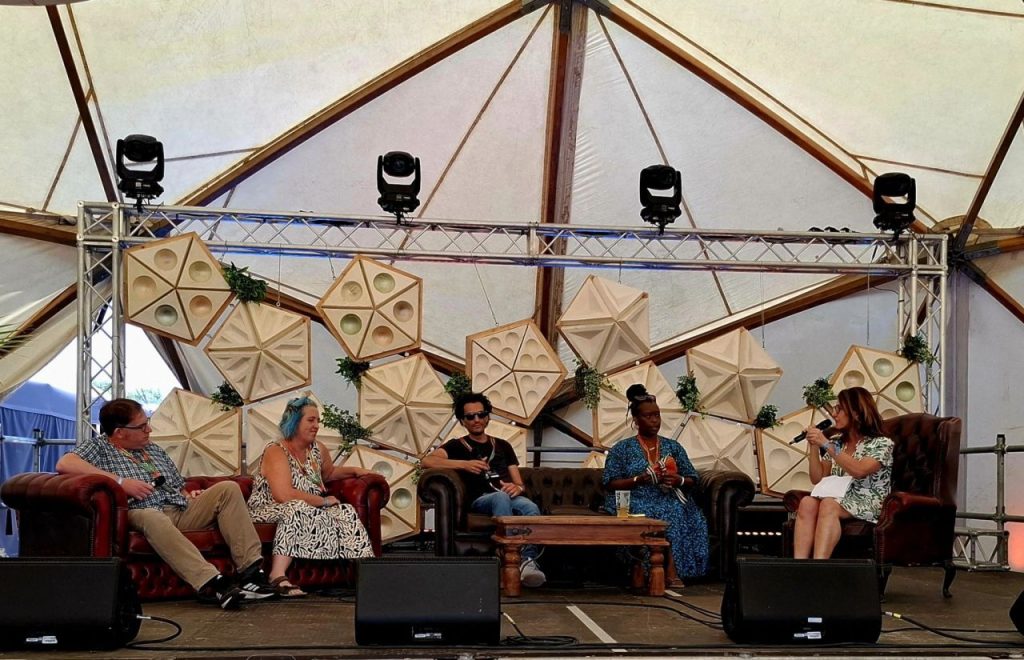
This year at the Forwards Festival, Citizens for Culture hosted a panel discussion on The Information Stage, presented by Jemma Forte and titled “Citizens for Culture: Obstacles and Opportunities.” This session, hosted on The Information Stage, aimed to explore how cultural initiatives can navigate challenges while seizing opportunities for growth and community engagement.
The panel featured LaToyah McAllister-Jones, our Lead Facilitator at Citizens for Culture, alongside notable industry leaders: Dr. Thom Oliver, a Senior Lecturer in Politics at UWE Bristol; Ruby Sant, an accomplished artist, designer, and maker; and Saad Eddine-Said, the CEO and Artistic Director of the New Art Exchange.
Saad Eddine-Said highlighted the importance of accountability and transparency in building trust, while Ruby Sant spoke about the role of creativity in sparking dialogue across communities and the role culture can play in healing fractures in communities. Dr. Thom Oliver reflected on how citizens’ assemblies can offer a more inclusive alternative to traditional politics.
“I’m interested in how organisations and institutions can share power and collaborate with communities in terms of decision making“ – Saad
“.…a Citizens Assembly for culture can help artists find work and make more community-centred decisions about what is funded in the region“ – Ruby
“Looking at democracy and government and how it transposes and translates into people’s lives through participation and representation. I am particularly interested in the work of Citizens for Culture and how a citizens’ assembly for culture can create new ways of working, foster innovation, and build trust in politics through democratic processes.” – Thom
Key points from the discussion included:
A recurring theme was the distinction between debate and deliberation. Unlike the adversarial style of parliamentary debate, citizens’ assemblies prioritise listening, reflection, and collective problem-solving.
At the end of the session, the audience was invited to respond to our two public-facing questions: “What cultural experience meant the most to you and why?” and “If you could create one cultural experience for your community, what would it be?”
The responses revealed a shared desire for connection through cultural activities. Ideas ranged from community meals and street parties to multi-faith celebrations and youth jazz bands. A few highlights included:
These reflections highlighted how citizens’ assemblies can strengthen individual voices, making decision-making more accessible and rooted in the lived experiences of the community, while fostering a sense of shared learning from the practices of other regions.
LaToyah shared her insights on the session: “I found it particularly useful to hear about the experience of my fellow panellists who spoke so passionately about the opportunity that citizens’ assemblies might offer in the future, particularly as a way to connect citizens to everyday democracy. It feels like we’re at an all-time low in terms of confidence in politics. We need to find ways to centre citizens’ voices in decision-making while reconnecting people with the issues that matter to them.”
The panel was also a springboard for what comes next, the first Citizens’ Assembly for Culture, which meets for the first time this month to begin discussions around shaping how communities can influence cultural decision-making in our region.
The discussion reminded us that culture isn’t just created on stages or in institutions – it begins in everyday shared spaces, with communities imagining and shaping their own shared cultural experiences.
As Thom concluded, assemblies work best when grounded in strong evidence to ensure everyone can be heard. That’s why we’re using Pol.is to gather opinions that will help to define ‘culture’. Join the conversation here.
Privacy Policy | Cookie Policy | Terms and Conditions | Contact Us | Site infomation